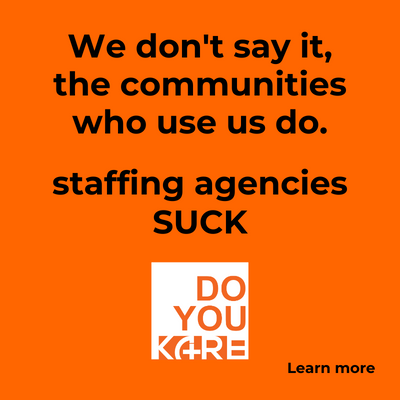By Jack Cumming
To start, I’m a resident. If that troubles you, consider how that thought makes your residents feel. Just this morning a vendor’s email reminded me of the resident-insignificance challenge.
A care-management software vendor was running a survey to promote its product. The vendor noted that their software could improve occupancy. A survey is not a bad idea. It might be a good way to attract new residents as well. Those who respond to a survey show interest in the software, or in the case of residents, in a potential move-in.
Opening with a Survey
It might be good in other ways as well. It can help you to get to know the prospect right at the start to see if they are a good fit for your offering. I was intrigued by the survey-enabled two-way conversational approach and wanted to see where it might lead, so I jumped in. Surveys can be fun.
The entire experience went off the rails right after that jump. It was a hard landing. The first question asked for the respondent’s “business” email. That set my warning registers to flashing red. The next question asked for my position in senior living. I decided to be honest. I checked “other” and then responded to the “specify” requirement by typing “resident.” I clicked “next.” The survey ended. Would I recommend that vendor to my provider? Not likely.
The messages from those opening two questions were clear. The software vendor wants your business, but they don’t give a hoot about you other than as a prospective buyer, and they care less about those on whom your business depends for success. The vendor was promising an “occupancy boost.” If residents aren’t central to occupancy, then who or what is?
Getting Acquainted
Despite this quasi-painful experience, the power of opening with a “let’s get to know each other” survey was evident. Most people like it when you take a genuine interest in them. But, there’s a clear reality. An internet contact, whether it’s a visitor to your website or the response to a survey invitation, shows no more than mild curiosity. That first web contact is the equivalent of driving past your building to see what it looks like.
Have you ever been to a cocktail party where you saw someone interesting across the room? It’s unlikely that you rushed right up to them to suggest you go off to dinner together. More likely you went near, waited till they were free, and then introduced yourself. Chances are that you then showed interest in getting to know them. If they were forthcoming, you may have begun an initial acquaintance, especially if there was enough mutuality to want to continue.
The initial interest that a person shows by going to your website is no different than that initial handshake.
An Encounter
Another web experience today took me a bit farther. Skimming through the online edition of the local newspaper, I stumbled across an ad for a new multilevel senior living community. I clicked through to the website and was immediately confronted by an intrusive popup box captioned “Community Assistant.” Hmmm . . . I hesitated, and then I clicked. Immediately, the “assistant” became a “sales bot.” I wasn’t ready for that.
To return to our cocktail party analogy, just because I shook your hand doesn’t mean I’m ready to get married. Here’s how that “chat” feature proceeded. “How can I help you today?” Choices: Schedule a Tour, Pricing, View Images, Ask a Question, Job Inquiry, View Floor Plans. I chose “Pricing.” Next question: “What level of care are you interested in?” Choices: Assisted Living, Independent Living, Not Sure, Other, Memory Care. My misgivings were rising exponentially. “Care?” Who said I needed care?
Escalating Discomfort
Next Question (bot is getting pushy): “Who is this for?” Choices: Relative, Myself, Spouse, Parent, Other, Friend. I clicked “Myself.” Next: “What is your timeline?” Choices: 3 Months, 1 to 3 Months, Immediately, Just Researching. I chose “Research.” After all, who’s in a hurry? Not me. Next: “What is your first and last name?” Choice: Type here . . . At that point, early in our acquaintance but when I was about done, I still had learned nothing about the dreams that had brought that community into being and that inspired its mission.
The key to sales success is to make your prospect a star and to show that you know and understand that star prospect. Great salespeople know this instinctively. As for care, the only “care” that’s appropriate at this stage is to show that you “care” about the person who has just shown that they “care” enough to have arrived at your website.
We Can Do Better
If you were seeking, say, less complicated living than a single-family house with its maintenance and isolation, would the “care” presumption put you off? News flash: healthy 90-year-olds don’t feel like they need care. It’s their kids who are freaked out by age. Let’s hope that your dream for your community isn’t as a place where adult children incarcerate their older parents.
Nevertheless, offering to get to know the person who wanders onto your website is a good idea. This requires rethinking the website as a relationship. You might envision it this way: the next time you meet a stranger, say, at a party, and they ask you what you do for a living, think of all that you love about what you do, and weave that into a script for a get-acquainted conversation with a stranger who just popped onto your website.
You might even ask a gifted playwright to help you get it right and to imagine appropriate tracks for all the reasons why someone came to your website. That survey can still be fun. It just takes creativity, seasoned with empathy. Let the process evolve naturally from that kernel. The prospect knows you want a sale. If it’s a good fit, it will work out for you. If it’s not a good fit, you’ll feel good for having done the right thing.
It’s About Timing and Trust
Your website is where you make that first impression. Your relationship website should support the buying experience. Some prospects know immediately that they want to come by for a tour. Others are more cautious, and they want to know more (and more) before revealing to you who they are. Appearing overeager for a quick sale can be fatal. Prospects, or their families, will make contact when they’re ready. but first, give them enough information so they feel that they know you and that you can be trusted.








